ASTANA – President Kassym-Jomart Tokayev paid a state visit to Baku, the capital of Azerbaijan, from March 11 to 12, further deepening the strategic and brotherly ties between the two nations and signifying a new chapter in Eurasian diplomacy.
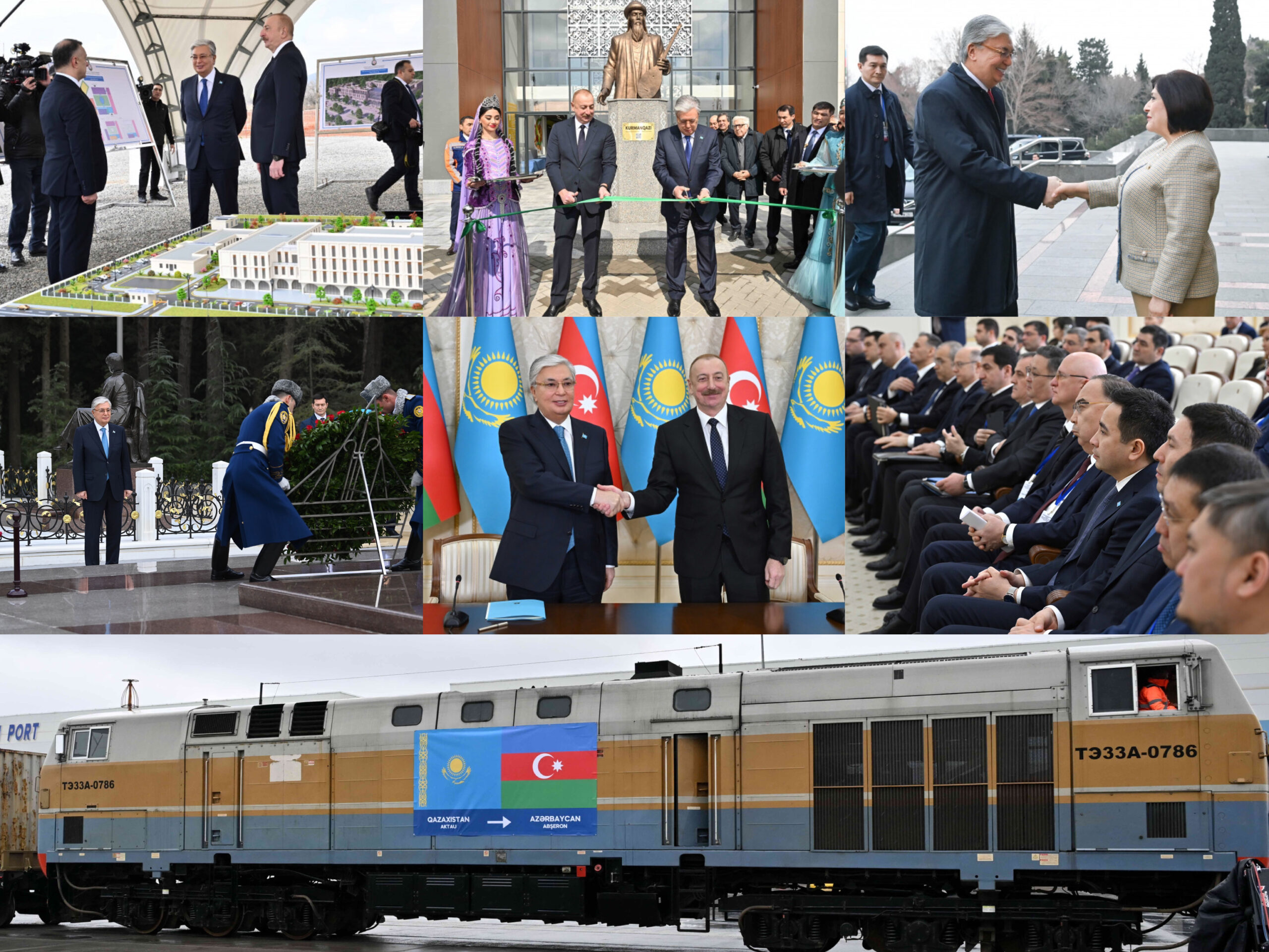
President Tokayev paid a state visit to Azerbaijan. Collage is created by The Astana Times. Photo credit: Akorda press service
Among the key highlights, he met with Azerbaijan’s President Ilham Aliyev, participated in the first meeting of the Supreme Interstate Council, and witnessed the arrival of a container train from Xi’an to Absheron. Fourteen documents were signed in two days of the visit.
The visit reflects both the strategic nature of bilateral ties and the deepening of cooperation among the broader Turkic world. President Tokayev himself described his visit as a “complete success.”
Centuries-old ties
Diplomatic relations between Kazakhstan and Azerbaijan date back to August 1992. But the roots of relations run deep, tracing back through centuries of shared history, culture, and mutual respect.
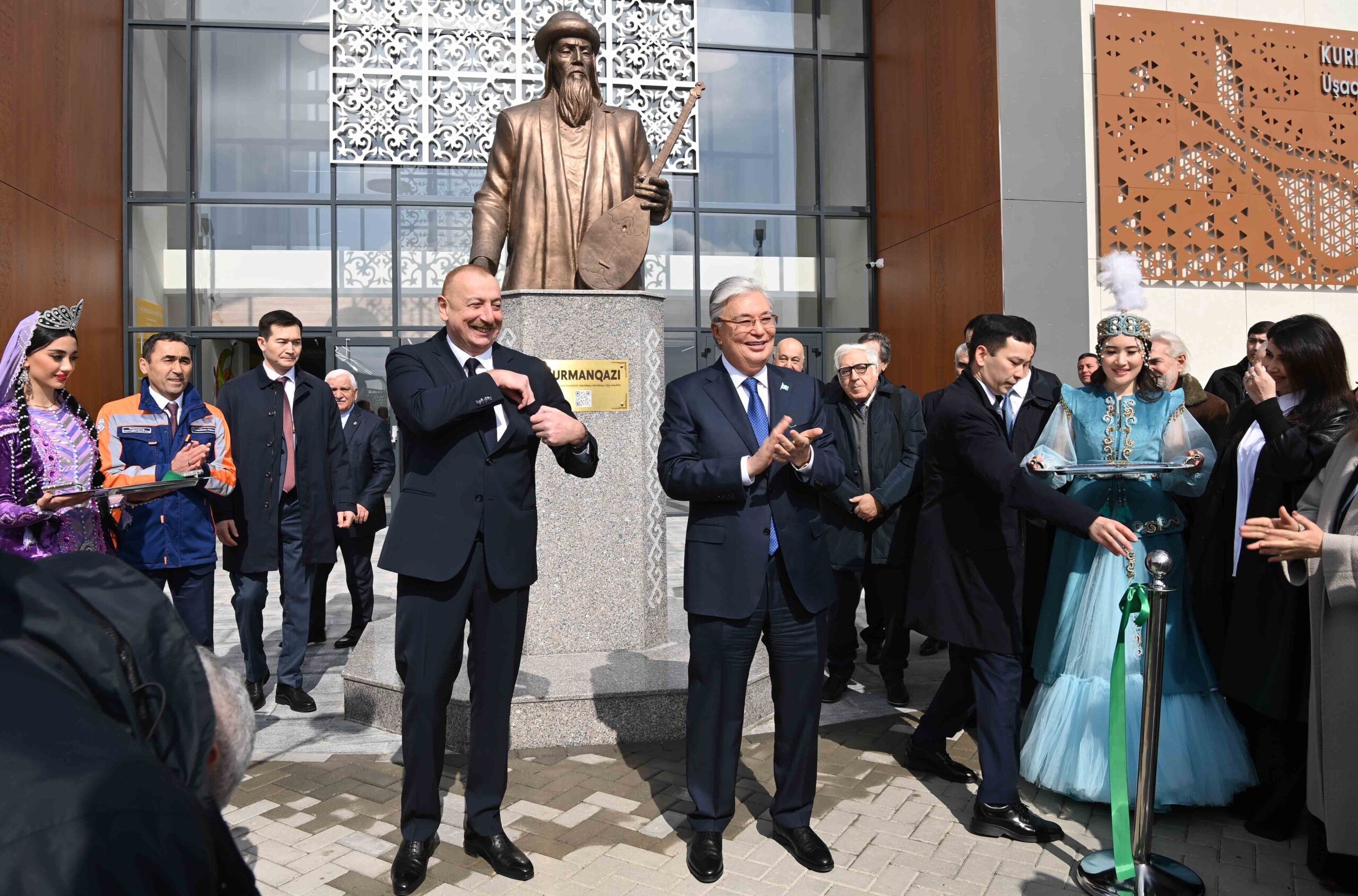
Kassym-Jomart Tokayev and Ilham Aliyev attend the center’s opening ceremony. Photo credit: Akorda
Both President Tokayev and President Aliyev are keen to explore ways to strengthen the strategic partnership. During their one-on-one meeting, the two leaders discussed, as Tokayev put it, “literally all the issues related to trade, economic, investment cooperation, and interaction in the international arena.”
Tokayev and Aliyev met several times in person in 2023. Tokayev welcomed the Azerbaijani leader in Kazakhstan for an official visit in April 2023 and for participation in the 10th anniversary summit of the Organization of Turkic States (OTS) in November 2023.
Tokayev himself visited Baku at the end of November 2023 to attend the summit of the United Nations (UN) Special Program for the Economies of Central Asia (SPECA).
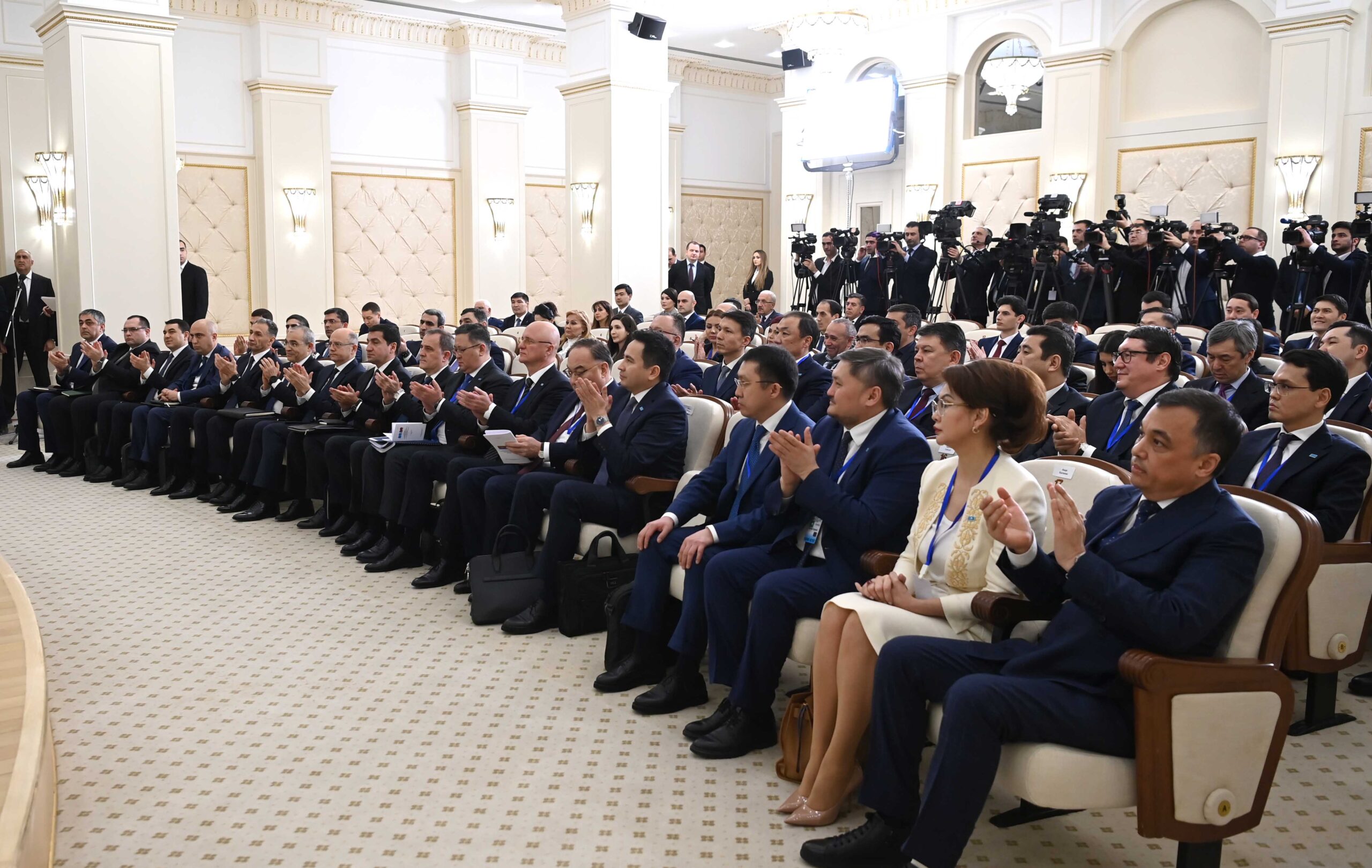
Kazakh and Azerbaijani officials during the press briefing of the two leaders. Photo credit: akorda.kz
Regular high-level contacts and deep personal connections showcase Kazakhstan and Azerbaijan as strategic partners and allies.
“The prospects are very good,” said the Kazakh leader as he addressed the first meeting of the Supreme Interstate Council of Kazakhstan and Azerbaijan. The establishment of the council was a key outcome of Aliyev’s visit to Kazakhstan last year.
Aliyev echoed Tokayev, saying Kazakhstan and Azerbaijan are “two fraternal states.”
“For many centuries, our people have lived in peace, brotherhood, and cooperation. Recently, the dynamics of our mutual visits have been very illustrative and indicate that relations have been given new dynamism. We rejoice at Kazakhstan’s successes,” said Aliyev.
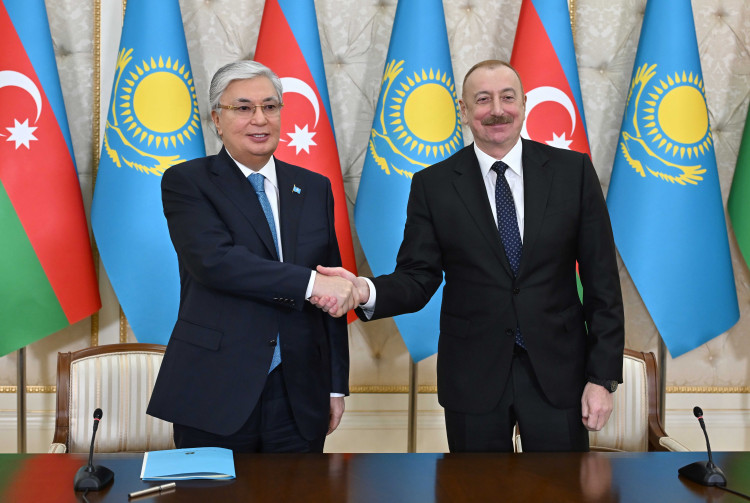
Tokayev and Aliyev shake hands at the press briefing in Baku on March 11. Photo credit: akorda.kz
For Kazakhstan, Azerbaijan is a key country in the South Caucasus region, said Almat Toyekin, an expert at the Astana-based Institute of Foreign Policy Research.
“There are no contradictions between our countries. A constructive, trust-based political dialogue has been established, and relations are founded on friendship, respect, and consideration of each other’s interests,” he told The Astana Times.
Aidar Kurmashev, head of the Department of Asian Studies at the Kazakhstan Institute for Strategic Studies (KazISS), noted that another notable trend in bilateral relations is the expanding legal framework.
“In just the last 18 months, approximately 40 significant bilateral documents have been signed. Additionally, 14 documents were signed at the conclusion of this visit,” said Kurmashev. Among these documents are the decision from the first meeting of the Supreme Interstate Council and the agreement on a strategic partnership between Samruk Kazyna [Sovereign Wealth Fund] and Azerbaijan Investment Holding, among others,” said Kurmashev.
Significant economic potential
According to Tokayev, trade turnover between Kazakhstan and Azerbaijan has increased fivefold since 2020.
Data from Kazakhstan’s Bureau of National Statistics indicates trade in 2023 hit $529.4 million, 14.3% more than in 2022. This is the highest-ever figure in bilateral relations.
Kazakh exports reached $456.3 million, and imports made up just $73.1 million. In 2020, trade was $109.2 million.

Infographics are designed by The Astana Times.
According to the Kazakh Foreign Ministry, the main export goods from Kazakhstan to Azerbaijan include crude oil, accounting for 23.5%, unprocessed aluminum, petroleum products and wheat, among others. The primary imports to Kazakhstan from Azerbaijan consist of pipes, tubes, and seamless profiles made of ferrous metals, cruise ships, ferries, and other passenger transport means.
Nearly 1,065 companies with Azerbaijani capital are registered in Kazakhstan, while approximately 150 companies with Kazakh capital operate in Azerbaijan.
According to the National Bank of Kazakhstan, from 2005 to 2023, the volume of investments attracted from Azerbaijan reached $380.8 million. This is twice less than Kazakhstan’s investments in the Azerbaijani economy – $116.6 million.
Energy cooperation
The two leaders stressed that the significant economic potential can be uncovered in many areas, from transport and logistics and digitalization to traditional oil and gas sectors.

Infographics are designed by The Astana Times.
According to Almat Toyekin, against the backdrop of what he deemed a “gas war” between the European Union and Russia and the closure of traditional routes for transporting oil and gas to European countries, the delivery of energy resources from the Caspian and Central Asia to Europe via Azerbaijan, and then further through Georgia and Turkiye is becoming more important.
“Kazakhstan, interested in supplying its energy resources to global markets, is increasing its exports via the Baku-Tbilisi-Ceyhan oil pipeline and the Baku-Tbilisi-Kars railway. Simultaneously, both sides are modernizing and expanding the capacities of the Baku, Aktau, and Kuryk ports,” said Toyekin.
As part of the visit, KazMunayGas national oil company and Azerbaijan’s SOCAR signed an agreement on a gradual increase in the volume of transit of Kazakh oil through the territory of Azerbaijan. They also signed a memorandum of strategic cooperation for the purchase and sale of Kazakh oil.
Middle Corridor
A highlight of the visit was the arrival of a container block train from the new Kazakh-Chinese transport and logistics center in Xi’an to the Absheron station in Azerbaijan along the Trans-Caspian International Transport Route (TITR) in just 11 days. The two leaders attended the ceremony via a video call.
TITR, also known as the Middle Corridor, is a multimodal transportation corridor that connects China, Central Asia, the Caspian Sea region, the Caucasus, and Europe. The route is an alternative to the traditional sea and land routes between Asia and Europe, offering faster and more efficient transportation of goods, as well as to the northern route passing via Russia.
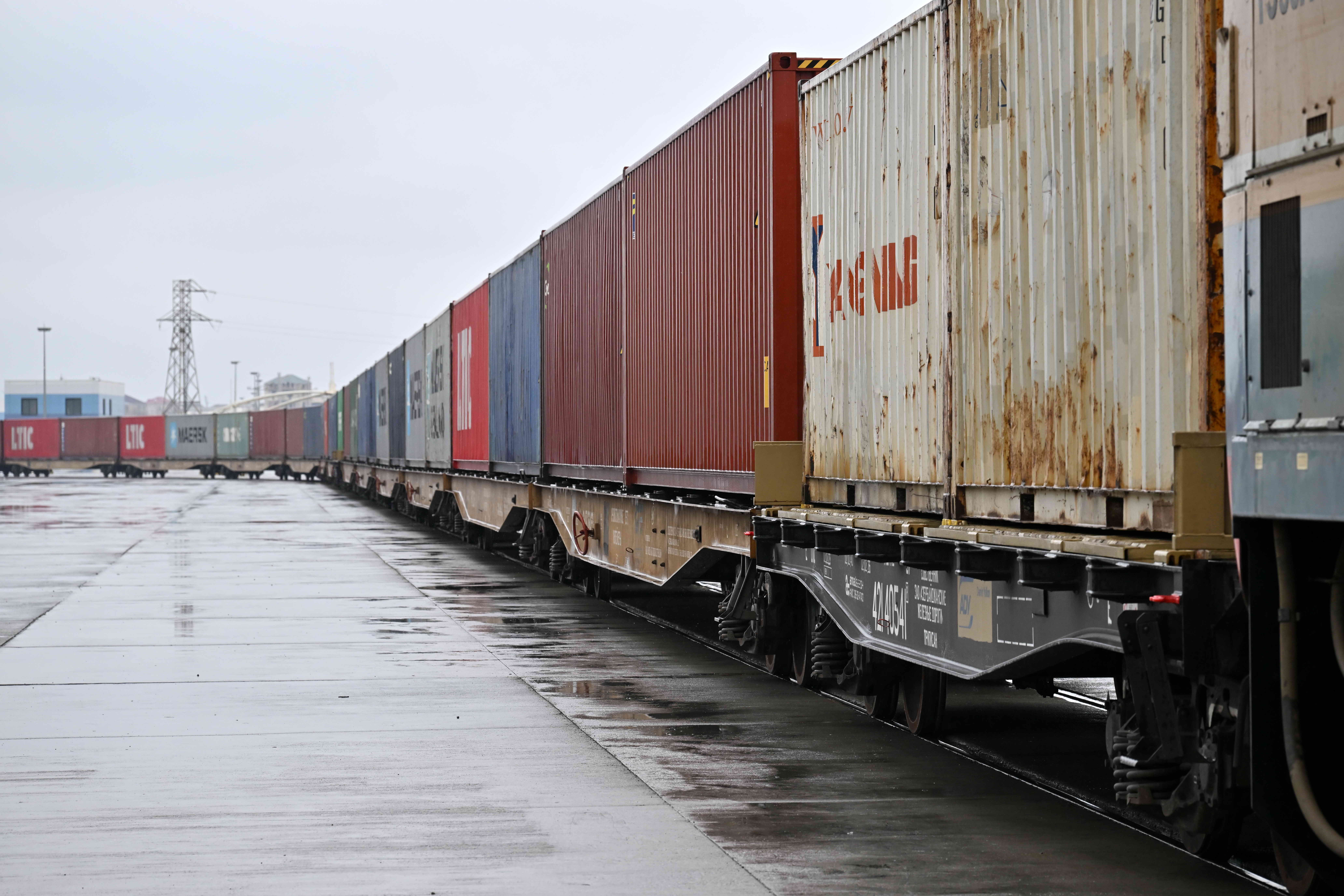
The arrival of the train was preceded by the opening of the Kazakh terminal and the launch of the first train connecting China – Kazakhstan – Azerbaijan on Feb. 28. Photo credit: akorda.kz
The arrival of the train represents a practical demonstration of the TITR’s viability as a major international transport corridor.
According to the Kazakh Ministry of Transport, the volume of traffic along the route increased by 65% in 2023, reaching 2.76 million tons, up from 1.7 million tons in 2022. In 2024, Kazakhstan plans to increase the volume by another 43% to reach 4.2 million tons.
The total capacity of TITR is currently estimated at six million tons or 80,000 containers per year. The range of goods transported includes non-ferrous metals, ferrous metals, chemical products, oil, petroleum products, wheat, construction goods, iron ore and consumer goods.
Last year, under the agreement between Kazakhstan’s KazMunayGas and Azerbaijan’s SOCAR, nearly one million tons of oil was shipped for the first time via the corridor.
By leveraging their geographical positions, Kazakhstan and Azerbaijan stand to benefit from increased trade flows, attract investment into their transport and logistics sectors, and enhance their roles as critical transit hubs between major markets.
“The TITR is now a reality that, in many ways, will determine the level of regional cooperation because it is impossible to become a transit country without good relations with neighbors. In this case, both Kazakhstan and Azerbaijan demonstrate their commitment to regional cooperation, strengthening their relations with neighboring countries. The Caspian Sea separates us, but today, it is not a barrier,” said Tokayev at a March 11 press briefing in Baku.
Over the past two years, countries along the TITR have been increasingly working together to enhance the route’s capacity to facilitate efficient transcontinental cargo transport.
In 2022, Kazakhstan signed roadmaps with Azerbaijan, Georgia, and Turkiye to address bottlenecks and develop the Middle Corridor by 2027. Kazakhstan Temir Zholy (KTZ) national railway company, Georgian Railway and Azerbaijan Railways inked an agreement to create a joint venture to develop multimodal service on the TITR in October 2023 in Tbilisi.
According to Almat Toekin, Western sanctions against Russia opened a “window of opportunity” for unleashing the potential of the Middle Corridor not only in transporting goods between China and Europe but also in delivering Central Asian gas through the Caspian Sea to Azerbaijan’s gas pipeline system.
Growing cooperation within the Turkic world
President Tokayev’s visit to Azerbaijan is part of a broader narrative of expanding cooperation within the Turkic world. This diplomatic engagement is not an isolated event but a reflection of a concerted effort to deepen ties within a region.
“In the matters of strengthening ties within the Turkic world, it is important to emphasize that it was precisely Azerbaijani land that, in 2009, hosted the signing of the Nakhchivan agreement on the establishment of the Cooperation Council of Turkic-Speaking States, which was later renamed to the Organization of Turkic States in the city of Nakhchivan, an initiative proposed by Kazakhstan. In this respect, Kazakhstan and Azerbaijan are the founders of the creation of the Turkic organization,” said Almat Toyekin.
He recalled the progress made in the development of the Middle Corridor following the OTS summit in Samarkand in November 2022.
“The leaders of Turkiye, Azerbaijan, and Turkmenistan achieved positive results [back then]. They agreed to create favorable conditions to facilitate mutual trade and investments, remove tariff and non-tariff barriers, reduce trade costs and speed up the transit of goods through the territories of the OTS by simplifying and harmonizing customs procedures,” said the expert.
According to him, the institutionalization of the OTS allows for the swift signing of agreements in the transport and logistics sphere, a process that would previously have taken years.
“The measures taken by the parties to increase the attractiveness of the TITR are significant, as this route was initially considered expensive and problematic due to high customs tariffs and long delivery times due to the need to cross several countries’ borders, especially through the Turkmen link, Turkmenistan – Uzbekistan – Kyrgyzstan – China,” he said.
According to him, the full activation of the TITR will lead to the formation of a new geopolitical role for the OTS in the region.

